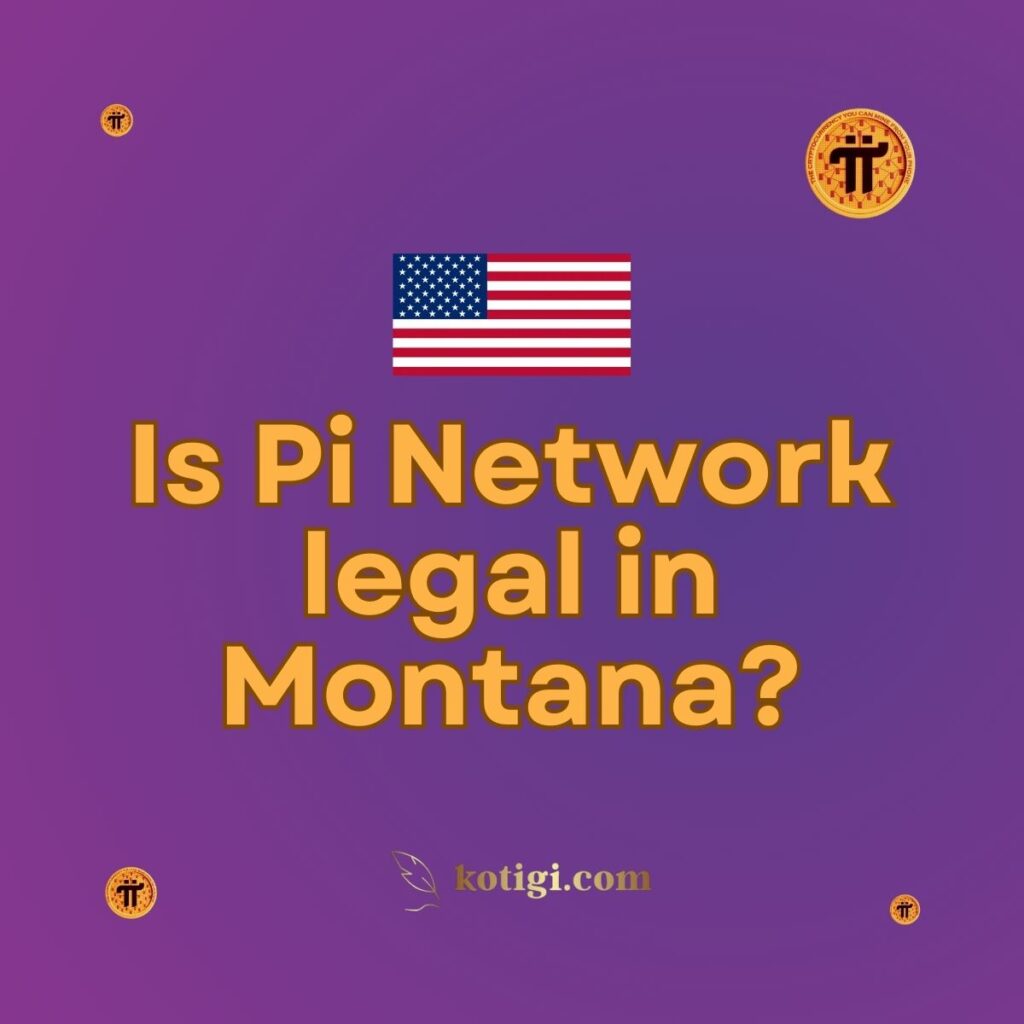
Is Pi Network legal in Montana?
Yes, Pi Network is legal in Montana. The state does not have specific regulations against Pi Network, as it operates under the broader cryptocurrency framework in the U.S., where federal regulations like KYC and anti-money laundering (AML) policies apply.
Introduction
As the cryptocurrency space continues to grow, people in different U.S. states, including Montana, are exploring Pi Network’s mining app and decentralized approach. Montana, known for its business-friendly environment, has yet to implement state-specific cryptocurrency regulations, which opens opportunities for Pi Network users. However, while state laws may be relaxed, federal laws still govern cryptocurrency activities, and Pi Network must comply with those. This article explores the legal landscape for Pi Network in Montana and the implications for users in the state.
Understanding Cryptocurrency Regulations in Montana
Montana stands out as a state without strict regulations on cryptocurrencies. Unlike states like New York, which require a BitLicense, Montana does not impose additional restrictions on cryptocurrency operations. This regulatory freedom means that Pi Network users in Montana can participate without significant state-level oversight.
Cryptocurrency and Blockchain Laws in Montana
Montana has generally adopted a hands-off approach to regulating cryptocurrencies. No specific laws target cryptocurrency mining, trading, or the use of digital currencies. This absence of regulation allows projects like Pi Network to operate freely within the state, providing users with a welcoming environment for digital currency activities.
Federal Oversight in Montana
While Montana does not impose strict state laws, federal laws still apply. Pi Network users in Montana must comply with U.S. regulations, particularly those related to anti-money laundering (AML) and know-your-customer (KYC) policies. These measures ensure that Pi Network is in line with federal guidelines, which aim to prevent fraudulent activity and ensure the security of financial transactions.
Advantages of Montana’s Regulatory Environment
Montana’s lack of strict cryptocurrency-specific laws offers an attractive environment for Pi Network users. Unlike in states where more rigorous regulations are in place, Montanans can enjoy a relatively unrestricted experience with Pi Network. This favorable legal setting encourages cryptocurrency growth and adoption, including decentralized projects like Pi.
Federal Cryptocurrency Guidelines Affecting Pi Network in Montana
Though Montana offers a more lenient regulatory environment for cryptocurrencies, users are still subject to federal regulations. Federal guidelines, including taxation and compliance, play a key role in how Pi Network operates across the U.S.
Compliance with Know Your Customer (KYC) Policies
Pi Network has implemented KYC measures to comply with federal requirements. This process involves verifying user identities to ensure that users are who they claim to be, preventing fraudulent activities such as money laundering or identity theft.
Anti-Money Laundering (AML) Laws
In line with federal laws, Pi Network follows Anti-Money Laundering (AML) regulations. These laws are designed to detect and prevent the use of cryptocurrencies for illicit activities. Users in Montana must adhere to these rules when participating in Pi Network.
IRS Cryptocurrency Tax Guidelines
The Internal Revenue Service (IRS) has established guidelines for reporting cryptocurrency income. In Montana, Pi Network users will be required to report any potential gains from Pi tokens once they become tradeable. Failure to report these earnings could result in penalties from the IRS, emphasizing the importance of understanding cryptocurrency tax laws.
The Role of Blockchain in Montana’s Legal Environment
Blockchain technology is key to the operations of cryptocurrencies like Pi Network. Montana’s stance on blockchain is relatively neutral, allowing its development and adoption in various sectors, including finance, supply chain, and healthcare.
Blockchain for Decentralization
Pi Network leverages blockchain technology to promote decentralization. In Montana, the legal framework surrounding blockchain is not restrictive, allowing users to benefit from the transparency and security features of the technology.
Legal Support for Blockchain Projects
Montana’s openness to blockchain technology has attracted a growing number of developers and entrepreneurs to the state. Pi Network’s underlying blockchain infrastructure fits well into this environment, where innovation is encouraged without regulatory barriers.
Future Blockchain Regulations in Montana
Although blockchain and cryptocurrency laws are not yet prominent in Montana, there is potential for future regulation. As blockchain adoption increases, lawmakers may introduce measures that affect how projects like Pi Network operate. Users should remain aware of any upcoming changes to state laws that could impact their use of Pi Network.
Challenges Pi Network Users May Face in Montana
While the legal landscape is generally favorable, there are challenges that Pi Network users may encounter in Montana. These challenges are primarily tied to potential regulatory changes and the evolving nature of cryptocurrency laws at the federal and state levels.
Potential for Future Regulation
As cryptocurrency becomes more mainstream, Montana may eventually impose regulations specific to digital currencies. These regulations could affect Pi Network users by imposing licensing requirements, taxation, or compliance measures similar to other states.
Security and Fraud Concerns
With the rising popularity of cryptocurrencies, concerns around security and fraud also increase. Pi Network users in Montana should remain vigilant against phishing attempts, fraudulent apps, and other online scams. Protecting personal data and cryptocurrency assets is critical to maintaining security.
Understanding Federal and State Laws
Even though Montana is lenient with cryptocurrency, Pi Network users must have a clear understanding of the federal laws that apply to them. Navigating tax requirements, reporting earnings, and complying with KYC measures are essential steps to remain within legal boundaries.
Tax Implications for Pi Network Users in Montana
Taxation is a significant concern for Pi Network users, especially once Pi tokens become tradable. Users must comply with both state and federal tax regulations, which can be complex in the context of cryptocurrencies.
Federal Tax Obligations
At the federal level, the IRS requires users to report any cryptocurrency transactions that result in gains or losses. Once Pi tokens become tradeable, any profits from mining or selling Pi tokens will need to be reported on federal tax returns.
State Tax Laws
Montana does not impose a state sales tax, which simplifies certain aspects of cryptocurrency transactions. However, Pi Network users are still subject to federal income taxes. Users should stay informed about any future changes to state tax laws related to cryptocurrencies.
Preparing for Tax Season
To ensure compliance, Pi Network users in Montana should maintain records of their mining activities and transactions. This will make it easier to report earnings accurately during tax season and avoid potential penalties from the IRS.
Conclusion
Pi Network is currently legal in Montana, thanks to the state’s relaxed stance on cryptocurrency regulations. While Montana has not enacted specific laws targeting cryptocurrency, Pi Network users must still follow federal guidelines, including KYC and AML compliance, as well as tax reporting requirements. As cryptocurrency continues to evolve, Pi Network users in Montana should remain aware of potential regulatory changes that could impact their activities on the network.
Key Takeaways
- Pi Network is legal in Montana, with no state-specific regulations restricting its use.
- Montana’s lack of cryptocurrency-specific laws allows Pi Network users to operate freely within the state.
- Federal regulations, including KYC and AML laws, apply to Pi Network users in Montana.
- Tax reporting will be required for any gains from Pi tokens once they become tradeable.
- Users should stay informed about potential future regulatory changes in Montana.





